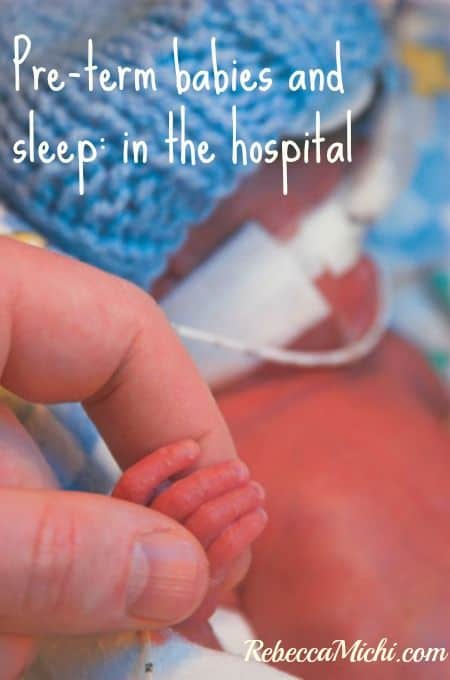Pre-term babies and sleep: in the hospital
Around one in nine babies in the United States are born prematurely, and 15 million worldwide. Pre-term birth is classed as before 37 weeks gestation and there are three categories:
- extremely preterm (<28 weeks)
- very preterm (28 to <32 weeks)
- moderate to late preterm (32 to <37 weeks) (World Health Organisation)
If your baby is born early, you may have lots of questions and hopefully your medical team can help you with any issues or concerns you have. Pre term babies can have different and additional needs compared to a full term baby, and there can be marked difference in sleep patterns too. Over the next two weeks we intend to look at pre-term baby sleep a little more closely, starting today with sleep patterns in the hospital.
Because they are born early, pre-term babies are not as fully developed as full term babies, and this can be immediately obvious in their appearance. Pre-term babies are smaller and, depending on how early they’re born, they can be very thin due to lack of body fat. A pre-term baby’s nervous system is also underdeveloped, which means that loud or sudden noises and sensations (including touch) and bright lights can be very frightening and have a disturbing affect. Pre-term babies can also find it hard to self settle and some may also retain the startle reflex for a lot longer than full term babies.
Whilst in the hospital, pre-term babies will be kept in rooms that are specially adapted to keep them comfortable. Lights will be dimmed to an agreed level, it will be warmer and staff will make every effort to keep sudden noises and movements at bay. All of this is to keep pre-term babies feeling as safe and secure as possible.
So how about the sleep?
- Newborn pre-term babies sleep a little more than full term newborns- they spend around 22 hours a day sleeping.
- Newborn pre-term babies usually sleep in one hour stretches. The reason for this is because their stomachs are a lot smaller than a full term baby’s and so meals are needed a lot more regularly.
- Newborn pre-term babies spend less time in deep sleep, compared to a full term newborn- in between hour long dozes, they tend to be very drowsy. This drowsiness can affect ability to feed too.
- Pre-term babies find it difficult to self soothe and so can often be unsettled .
- Medical staff at the hospital will need to move some pre-term babies as they sleep- this means that they will regularly re-position your baby to prevent a flat patch occurring on the head.
- Medical staff may also position your pre-term baby on her front or side for sleeping, to aid breathing. This is fine in the hospital as there will be constant monitoring, and staff will ensure they adjust the sleeping position to lying on the back before discharge.
In the hospital, medical staff are specially trained to care for your pre-term baby and many are not discharged until they are at least full term and as healthy as possible. While your baby is in the hospital it can be scary and confusing and many parents of pre-term babies take comfort in speaking to other parents in the same boat. Most of the parenting manuals you will read will probably not go into pre-term birth in much detail and that can be frustrating. If you can, search online and speak to your medical team as much as you can with any questions you have.
For a more indepth examination of the importance of sleep for pre-term babies, please see this article from Peekaboo ICU.
Over on Facebook, I asked a few parents how they found parenting their pre-term babies, and in particular how they found their sleeping. Over all, many parents of late pre-term babies (born closer to 37 weeks) told me that they didn’t notice any real difference in sleeping patterns. Certainly, the patterns they spoke of did not seem vastly different to what you would expect with a full term baby. Parents of earlier pre-term babies did not notice that sleeping patterns were perhaps a little different. We’ll talk about this more in the next post, which will look at what to expect from your pre-term baby’s sleeping habits once they are discharged from hospital.
If you are a parent of a pre-term baby and would like to talk about their sleeping patterns, do please get in touch!




